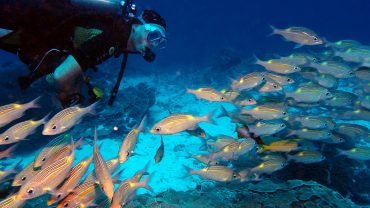10 Things About Scuba Diving

10 things about scuba diving If you have had the chance to look down on the earth from a high altitude, then there must have been that moment where you were in awe at how large the earth’s crust is. Miles upon miles of soil, rock, and dirt.
Now think that this is just one-third of the surface of the earth with the remaining two-thirds covered by water and you’ll begin to see why many are drawn to explore this hidden underwater world.
And to help you do that is the activity of scuba diving. It is a type of underwater diving that allows you to go deeper and stay under for longer with the use of breathing equipment at Zanzibar dive centers.
Here are 10 things about scuba diving:
- What does ‘scuba’ mean?
Speaking of breathing equipment, the word “scuba” stands for self-contained underwater breathing apparatus. With it, divers inhale air that has been compressed while exhaling carbon dioxide outside of the apparatus into the water.
- What’s the suit all about?
You must have noticed that scuba diving involves wearing a wetsuit. There are two main functions of clothing. First, it keeps the divers warm. The second purpose is to make them more buoyant and gain more control underwater.
- The Regulator
This is a part of the scuba diving equipment that features two main parts. One of its parts prevents a rush of air into the diver from the air compressed in the tank and controls how it is released. The second involves a valve that closes and opens as the diver exhales and inhales.
- Is it dangerous?
Absolutely! scuba diving is in fact among the most dangerous activities that one could partake in but it doesn’t stop millions of people all over the world from learning how to scuba dive. It is considered safe for those who are trained by certified instructors, and who respect the ocean.
- Lost for sound
Did you know that sound travels faster in water than in air? In fact, up to five times. This means that scuba divers are unable to determine which direction a certain sound came from. Being terrestrial animals, humans cannot deal with the fast speeds of sounds underwater.
- Who is Richard Presley?
He holds the world record for the longest scuba diving having stayed underwater for a whopping 69 days and 19 minutes, a feat which he accomplished in the United States in Florida back in 1992. While the record is by no means the deepest, it is indeed the longest ever accomplished by a human.
- Depth
There is a directly proportional relationship between depth and pressure. For every 10 meters of depth, pressure increases by 1 atmosphere. (An atmosphere is a pressure on our bodies when we stand at sea level – about 14.6 pounds of pressure per square inch of skin). So, at 10 meters of depth, our bodies have double the pressure on them than at sea level. And at 20 meters, about 3 times.
- Many uses for scuba diving
There are many fields that use scuba diving including scientific and recreational purposes. Speaking of recreational, scuba diving brought a welcome boost for underwater tourism.
- Oxygen can get dangerous
Under extreme pressure, oxygen becomes toxic. Special thanks for deeper dives of over 40 meters contain gas which is a mixture of low quantities of oxygen and other special gases.
- Spitting is good
Spitting on the mask before taking the dive forms a layer on the mask that prevents fogging.





Comment (0)